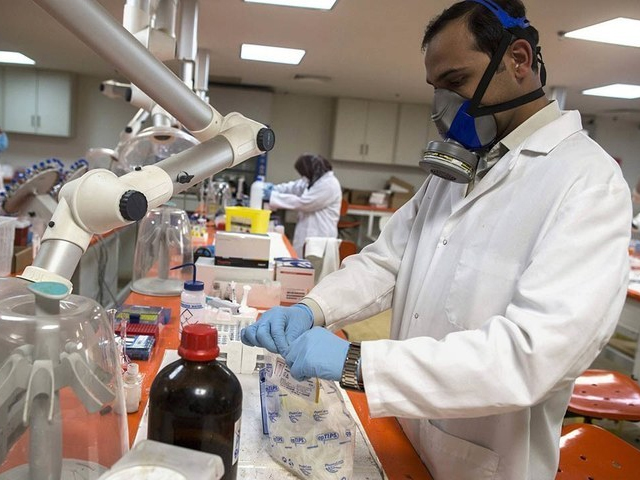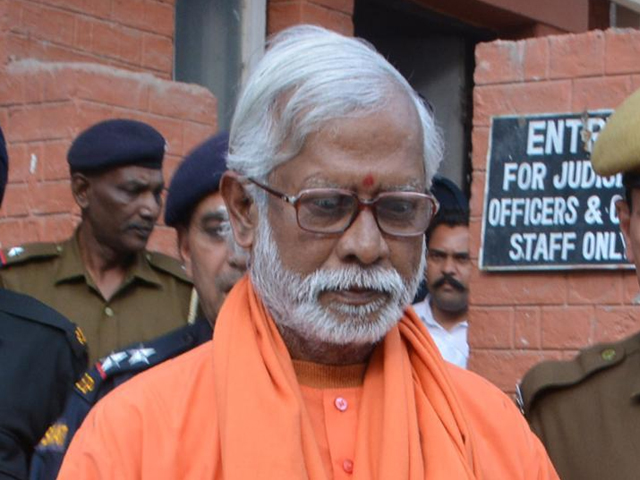
Forensic scientists analyse samples at the Punjab Forensic Science Agency. PHOTO: REUTERS
Why do we only have one advanced forensic lab in the entire country?
Though Sindh and Peshawar have such facilities, their use of antiquated tools leads to delays and unreliable results
Mudassar Ali, a 21-year-old young man, was caught by the Kasur Police in February 2017 and was subsequently murdered by them in an ‘encounter’, as the police believed he had raped and murdered four-year-old Iman Fatima. In an interesting development, DNA tests conducted a year later on Imran Ali – the man who raped and murdered seven-year-old Zainab – evidenced he not only killed Zainab, but that Iman was also one of the many victims of his brutality.
Sadly, if the Kasur Police had made timely use of forensic science while investigating Iman’s case, not only Mudassar but other victims of Imran, including Zainab, could have been saved.
In modern times, technology has created its own space in the world of crime and its investigation. Criminals use high tech to execute their acts, initiating a challenge for law enforcement agencies to probe and counter such activities using their own technology. This cat and mouse chase between criminals and law enforcers continuously seeks timely innovation and improvisation. But while the modernised and developed West has achieved unprecedented advancement in technology and scientific methods, the developing world, while receptive to technological advancement, has failed at making it a priority.
Pakistan being a prominent developing country has been facing the same problem, for it lacks the advanced facilities to enhance its capabilities to probe crimes. This is largely due to the government’s failure to prioritise this matter.
Forensic science is the application of scientific methods to help unearth the minute realities of an act, may it be criminal or civil in nature. While remaining receptive to using the scientific method in investigations, Pakistan lacks the facilities to execute this while catering to a population of over 200 million. At the moment, Pakistan has only one accomplished forensic lab in the entire county that has the capability to forensically examine the cases presented before it and, as expected, it has limited resources when it comes to catering to investigations popping up across the land.
The Punjab Forensic Science Agency (PFSA) in Lahore is indeed a multi-million dollar, state of the art facility provided to us by the previous provincial government under the leadership of Shehbaz Sharif. The facility is equipped with the most advanced technology being used throughout the developed world, and while it is a provincial agency, it is at the moment overseeing cases from all over Pakistan.
On the national level, initiating the National Forensic Science Agency (NFSA) is indeed a positive step towards bringing the scientific method to criminal investigations across Pakistan. However, the agency has yet to enhance its reach in terms of the fields it investigates. It has a lack of resources that prevent it from fully functioning alongside law enforcement agencies in accordance to their needs.
The government of Sindh recently announced its intention to establish serology and DNA forensic labs at Karachi University, which would then be utilised by both, security agencies and investigating authorities. Nonetheless, at the moment, the province is outsourcing its investigations to the PFSA. Though Sindh has forensic facilities available, they use antiquated tools to examine and investigate cases, resulting in unnecessary delays and unreliable results.
The Forensic Science Laboratory (FSL) Peshawar has been functional for a while now, including providing DNA testing services, but this facility does not meet the standards of a forensic laboratory. Here, too, a majority of the cases are still being outsourced to the lab in Punjab.
On the contrary, Balochistan and Azad Kashmir have no modern forensic facilities at the moment, and they outsource their cases to a limited facility in Islamabad or to the accomplished facility in Lahore. Normally, this outsourcing process adds several days to obtaining results, and the delay itself suspends the efficiency of the case in question.
Additionally, this practice of outsourcing most cases from every province to the already overburdened PFSA creates a situation of desperation and heightened load for the said agency. After the 18th Amendment, it should be expected for each provincial government to invest in their own autonomous forensic science agencies to help execute their duty to safeguard the people at large.
Inquiring the expense required to establish an accomplished forensic science laboratory, I was told by Usman Siddique, a forensic scientist working in the UK, that the effort can cost millions of dollars, depending upon the needs of the law enforcement agencies. The crime rate, population and number of law enforcement agencies benefiting from the facility are the primary aspects considered when determining whether an agency should be established. Furthermore, maintaining the labs later on also requires heavy funding, as the methods used to probe cases are frequently improved and are expensive to maintain.
A source within PFSA, on the condition of anonymity, informed me that the constant delivery of funds often gets delayed, which leads to delays in the delivery of services.
Ultimately, it is the provincial governments that are negligent towards this core issue, and they must act fast to invest in the field in order to improve performance and counter the crime rates in every province. The establishment of accomplished forensic science labs on the provincial level is thus the need of the hour. Moreover, earmarking adequate funds to maintain such exclusive facilities must also become a priority of the concerned authorities and departments.
It is absolutely critical that the precedent set by the government of Punjab is followed by the rest of the provinces. After all, the establishment of an autonomous agency for forensic science in the wake of the 18th Amendment has strengthened the capacity of law enforcement agencies in the province of Punjab. With the PFSA at their aid, the agencies in Punjab are better equipped to investigate crime.
Interestingly, in yet another case that made waves nationally, the PFSA was approached yet again by the Sindh Food Authority and Karachi Police. After two minors passed away in Karachi after eating out at a high-end restaurant, the suspected cause of death was food poisoning. Not only the food samples but the post-mortem reports were also sent to be investigated by the PFSA in order to determine the cause of death. Strangely, half the evidence was sent by train and the other half by air.
In any case, the Sindh government was once again exposed for its inability to govern. If only they had invested in establishing an accomplished forensic science lab in Sindh, the samples of an important case, which even Chief Justice Saqib Nisar took notice of, would not have been outsourced, once again causing unnecessary delay in the investigation.
Meanwhile, the Khyber Pakhtunkhwa police has been ordered by the Supreme Court to investigate the infamous Kohistan honour killings case by forensically testing the videos. In a 2011 incident, four young girls and two boys were brutally murdered for dancing at a wedding ceremony in a hilly village in Kohistan. As the case got international traction, it shaped up to become a high-profile case. The continued investigations regarding the video footage make it evident that every technology available must be utilised to probe deep into such cases so as to bring forth not just the truth but the whole truth.
Lastly, in order to save many more little Zainabs from brutal rape and murder cases and many more Mudassars from fake encounters on the basis of incomplete investigations, the usage of scientific methods must be made available throughout the country. Both provincial and federal governments need to prioritise the delivery of forensic science, and not only establish but also continuously maintain said services in order to counter crime in a country like Pakistan that has been plagued not only by continuous social menace but also terrorism for more than a decade, with no end in sight if things do not change.




COMMENTS (3)
Comments are moderated and generally will be posted if they are on-topic and not abusive.
For more information, please see our Comments FAQ